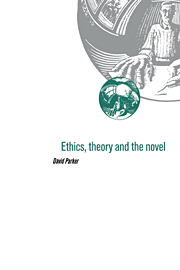Book contents
- Frontmatter
- Contents
- Acknowledgements
- Part I THE ETHICAL UNCONSCIOUS
- Chapter 1 Evaluative discourse: the return of the repressed
- Chapter 2 A new turn toward the ethical
- Chapter 3 The judgmental unconscious
- Chapter 4 The libidinal unconscious
- Chapter 5 Dynamic interrelatedness: or, the novel walking away with the nail
- Part II SOCIAL BEINGS AND INNOCENTS
- Part III TOWARDS A NEW EVALUATIVE DISCOURSE
- Notes
- Bibliography
- Index
Chapter 3 - The judgmental unconscious
Published online by Cambridge University Press: 05 November 2011
- Frontmatter
- Contents
- Acknowledgements
- Part I THE ETHICAL UNCONSCIOUS
- Chapter 1 Evaluative discourse: the return of the repressed
- Chapter 2 A new turn toward the ethical
- Chapter 3 The judgmental unconscious
- Chapter 4 The libidinal unconscious
- Chapter 5 Dynamic interrelatedness: or, the novel walking away with the nail
- Part II SOCIAL BEINGS AND INNOCENTS
- Part III TOWARDS A NEW EVALUATIVE DISCOURSE
- Notes
- Bibliography
- Index
Summary
As the case of Edward Casaubon reminds us, imaginative literature has been much preoccupied with forms of ethical unconsciousness: Casaubon is not conscious of his narcissism in the way in which the novel makes us aware of it. Specifically he is never aware of how common it is, according to the novel, to imagine that we are uniquely important in the universe. In this, Casaubon is not ‘different’ as he imagines, but a certain kind of person, with much in common, for instance, with Lydgate, Bulstrode, and, at first, Dorothea Brooke. All of these have in common the fact that they imagine themselves morally better, each in his or her unique way, than the rest of humanity. According to the novel, they are never more like the rest of humanity than in their tendency to judge other people's moral shortcomings more or less censoriously. The ordinary Middle-marchers are not slow to respond in the same measure, for example, judgmentally calling Bulstrode a ‘Pharisee’ – thus mirroring the very judgmentalism they reject in him. But, according to George Eliot, judgmentalism is almost ubiquitous; we face it at every turn in the moral life. As she says, so inimitably, ‘for the majority of us scarcely see the faultiness of our own conduct more than the faultiness of our own arguments, or the dullness of our own jokes’ (p. 217). If Bulstrode is a so-called ‘Pharisee’, then so, allegedly, are the majority of us. This tendency to be blind to the signs in ourselves of the very failings we see in others I am calling the ‘judgmental unconscious’.
- Type
- Chapter
- Information
- Ethics, Theory and the Novel , pp. 43 - 52Publisher: Cambridge University PressPrint publication year: 1994



